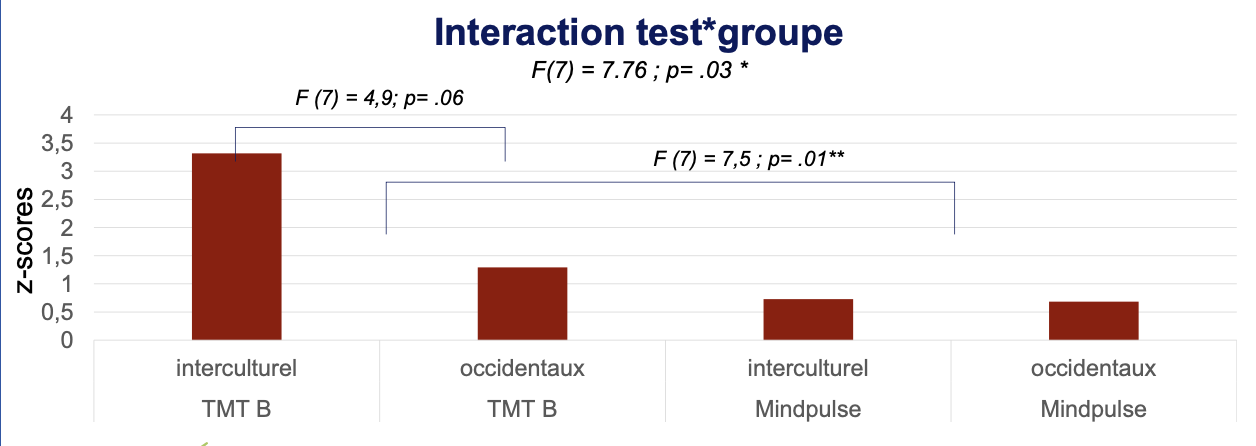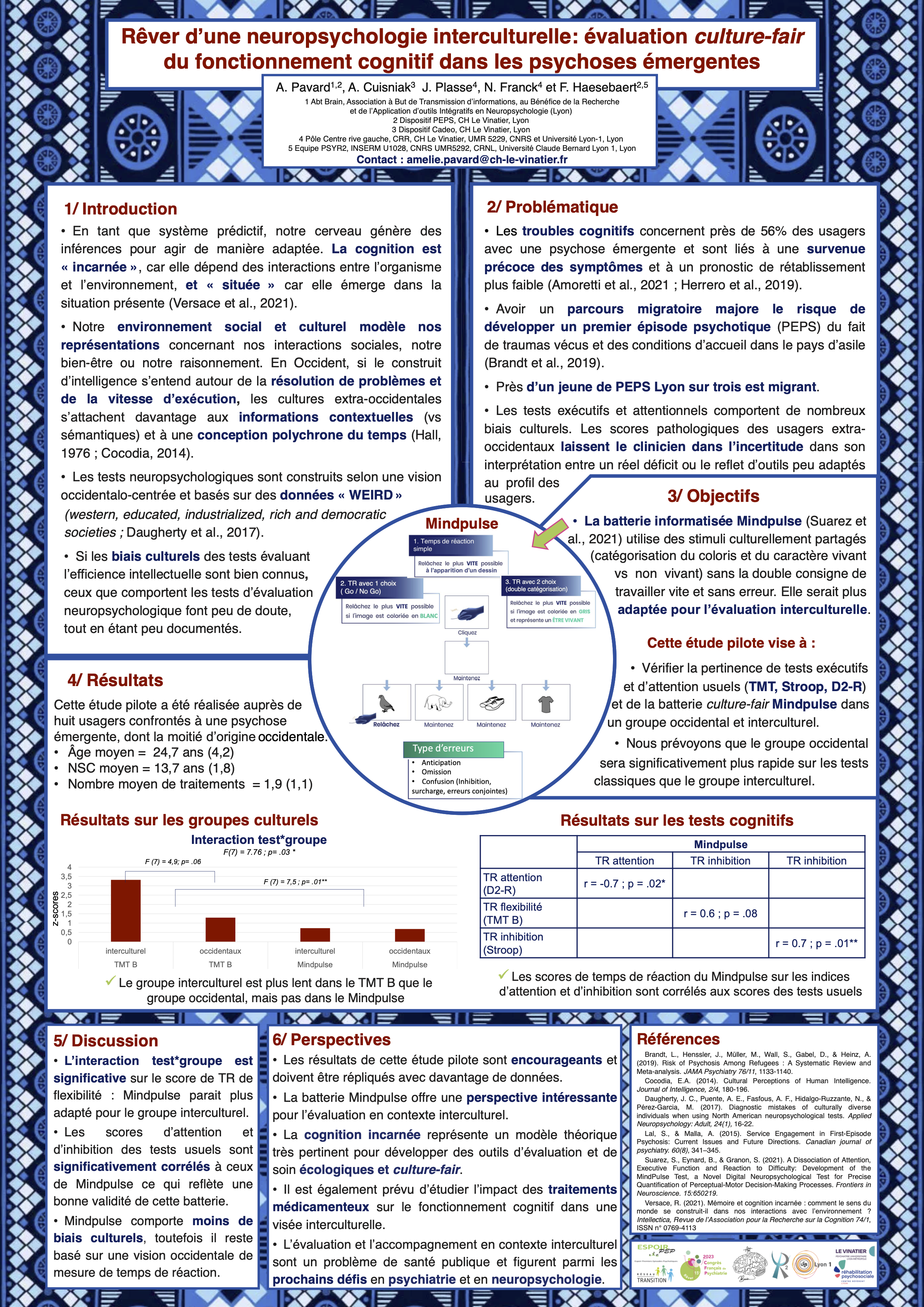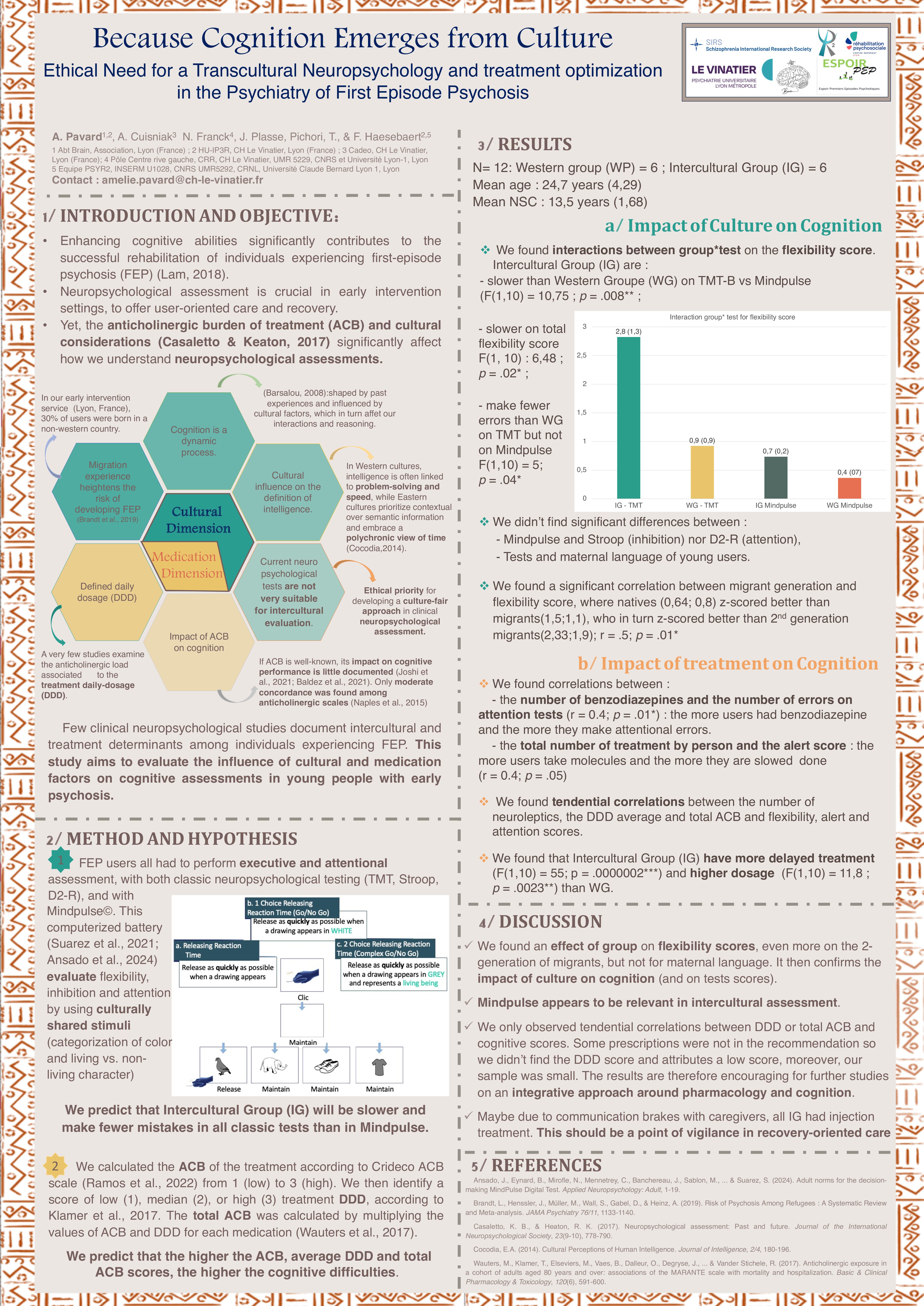Dreaming of an Intercultural Neuropsychology: Culture-Fair Assessment of Cognitive Functioning in Emerging Psychoses
Pavard. A., Cuisiniak, A., Plasse, J., Frank. N., & Haesebaert, F.
Poster published in French at Congrès Français de Psychiatrie, December 2023
Poster published in English at Schizophrenia International Research Society, March 2024
Abstract
This poster, created in collaboration with Abt Brain, explores the intersection of #interculturality and #embodied #cognition. It emphasizes that cognition is a dynamic process influenced by our #cultural representations. The poster criticizes neuropsychological tests, primarily designed with a Western problem-solving logic, as inadequate for #intercultural assessment. The MindPulse FR battery, developed by Sandra Suarez Eynard and colleagues, is introduced as a culturally relevant alternative.
Context:
Context
-
As a predictive system, our brain generates inferences to act adaptively. Cognition is "embodied,"as it relies on interactions between the organism association and the environment and "situated" as it emerges in the present situation (Versace et al., 2021).
-
Our social and cultural environment shapes our representations of social interactions, well-being, or reasoning. In the West, the construct of intelligence revolves around problem-solving and speed of execution,whereas extra-Western cultures place more emphasis on contextual (versus semantic) information a polychronic conception of time (Hall, 1976 ; Cocodia, 2014).
-
Neuropsychological tests are constructed based on a Western-centric view and rely on data from "WEIRD" societies (western, educated, industrialized, rich and democratic societies ; Daugherty et al., 2017).
-
While the cultural biases of tests assessing intellectual efficiency are well-known, those present in neuropsychological evaluation tests for ess certain, despite being poorly documented.
Problematic
-
Cognitive disorders affect nearly 56% of users with an emerging psychosis and are associated with an early onset of symptoms and a poorer prognosis for recovery (Amoretti et al., 2021; Herrero et al., 2019).
- Having a migratory background increases the risk of developing a first-episode psychosis due to experienced traumas and the conditions’of reception’on the host country (Brandt et al., 2019)
- Nearly one’in three FEP youths in Lyon is a migrant.
- Executive and attentional tests exhibit numerous cultural biases. Pathological scores in non-Western users leave clinicians’uncertain in their interpretation, oscillating between a genuine deficit’and the reflection of tools poorly adapted to the users' profiles.
Objective of the study:
-
The computerized Mindpulse battery (Suarez et al., 2021) utilizes culturally shared stimuli (color categorization and living vs. non-living character) without the dual instruction to work quickly and without error. It would be more suitable for intercultural evaluation.
- This pilot study aims to:
-
- Verify the relevance of usual executive and attentional tests(TMT, Stroop, D2-R) and the culture-fair Mindpulse battery in both a Western and cross-cultural group.
- We anticipate that the Western group will perform significantly faster on traditional tests compared to the intercultural group.
This pilot study was conducted with eight users experiencing an emerging psychosis, half of whom were of Western origin.
- Mean Age= 24,7 y.o (4,2)
- Average years of education = 13.7 years (SD = 1.8)
- Average number of treatments = 1.9 (SD = 1.1)
Executive and attention evaluation
MindPulse (Decision-making)
Stroop (Inhibition)
D2-R (Sustained attention)
TMT (Flexibility)
Results
Results on cultural groups

The cross-cultural group is slower in the TMT B compared to the Western group but not in the MindPulse.
Results on cognitive tests

The reaction time scores in MindPulse for attention and inhibition indices are correlated with scores from conventional tests.ls
Discussion
-
The test*group interaction is significant on the flexibility TR score: Mindpulse appears more suitable for the intercultural group.
-
Attention and inhibition scores of association and usual tests are significantly correlated with those of Mindpulse, reflecting good validity of this battery.
-
Mindpulse exhibits fewer cultural biases, however, it is still based on a Western perspective of reaction time measurement.
Futur directions
- The results of this pilot study are promising and warrant replication with more data.
- The Mindpulse battery provides an interesting perspective for evaluation in intercultural contexts.
- ' Embodied cognition represents a highly relevant theoretical model for developing ecological and culture-fair assessment and care tools. culturally fair assessment and intervention tools.
- It is also planned to investigate the impact of medication treatments on cognitive functioning with an intercultural focus.
- Evaluation association and support in intercultural contexts are public health issues and are among the next challenges in psychiatry and neuropsychology.
Poster published at Congrès Français de Psychiatrie,
December 2023

Poster published at Schizophrenia International Research Society,
March 2024

